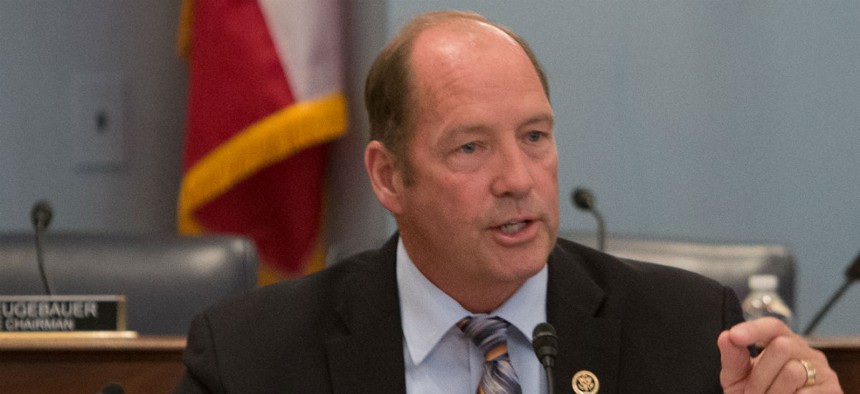
Rep. Ted Yoho, R-Fla., introduced the bill. Flickr user House Committee on Agriculture
Lawmaker Looks to Expedite Federal Firings, Demotions and Pay Cuts
Bill would allow for one level of appeal.
A conservative lawmaker introduced legislation this week to expedite the disciplinary process throughout the federal government, allowing agency heads to more quickly fire, demote or cut the pay of their employees.
The 2017 Federal Employees Accountability Act, introduced by Rep. Ted Yoho, R-Fla., would limit the time federal employees have to appeal a negative personnel action and restrict the number of appeals they could file to just one. Employees would not receive any pay or benefits throughout the appeal process. The measure would enable agency heads to immediately fire employees, move them to a lower General Schedule grade or reduce their pay.
Employees would have seven days to appeal to the Merit Systems Protection Board a firing, suspension or other action. MSPB would then have 45 days to issue a ruling on the appeal. If the board did not act in that timeframe, then the agency’s decision would stand.
“It hurts the morale in the agency when they know they have a bad player and they see them getting transferred laterally” rather than fired, Yoho told Government Executive when he introduced similar legislation last year. The current system has ushered in a culture of “protectionism,” he added.
The congressman said “in the real world,” private sector employees would be fired immediately in cases in which federal workers are merely suspended.
Due process for most of the federal workforce now requires that agencies notify employees within 30 days of an adverse action (including removal), and provide them with seven days to respond and an opportunity to defend themselves. The average initial MSPB appeal takes about 90 days. Employees are also currently able to further appeal to MSPB’s central board, as well as federal court.
In addition to likely pushback from lawmakers and groups that will accuse Yoho’s legislation of stripping federal workers of adequate due process protections, the measure could run into legal issues. Recent efforts to ease the firing of federal employees, targeting VA’s senior executives, have stalled after the Obama administration’s Justice Department decided not to defend attempted reforms in court due to concerns over constitutionality. VA has said it will no longer use the authority Congress granted it in 2014 to quickly remove top managers accused of wrongdoing, sending lawmakers back to the drawing board.
A House-backed measure aimed at expediting the disciplinary process at VA would, unlike Yoho’s bill, enable second- and third-level appeals by the department’s employees. Yoho’s bill could potentially provide relief to whistleblowers, as the Office of Special Counsel would have to sign off on disciplinary action against employees seeking corrective action with it.







